- Home
- Michael Swanwick
The Mongolian Wizard Stories (online stories 1-7)
The Mongolian Wizard Stories (online stories 1-7) Read online
The Mongolian Wizard Stories
Michael Swanwick
“The Mongolian Wizard”
copyright © 2012 by Michael Swanwick
Art copyright © 2012 by Gregory Manchess
“The Fire Gown”
copyright © 2012 by Michael Swanwick
Art copyright © 2012 by Gregory Manchess
“Day of the Kraken”
copyright © 2012 Michael Swanwick
Art copyright © 2012 Gregory Manchess
“House of Dreams”
copyright © 2013 by Michael Swanwick
Art copyright © 2013 by Gregory Manchess
“The Night of the Salamander”
copyright © 2015 by Michael Swanwick
Art copyright © 2015 by Gregory Manchess
“The Pyramid of Krakow”
copyright © 2015 by Michael Swanwick
Art copyright © 2015 by Gregory Manchess
“The Phantom in the Maze”
copyright © 2015 by Michael Swanwick
Art copyright © 2015 by Gregory Manchess
The Mongolian Wizard
The wild griffins for which the region was famous were sporting in the sky above the snow-clad peaks of the Riphean Mountains when Sir Toby arrived at Schloss Greiffenhorst, late as usual. The moot had been in session for three days and, truth be told, no one had noticed his absence until his carriage clattered into the courtyard. Then there was such a to-do, with horses ramping and snorting white plumes of steam and footmen unloading brass-bound trunks and the building-master of the conference center shouting and turning red as he tried to wave the luggage around to the back of the building, that the English lord’s emergence came as a distinct anticlimax.
But then Sir Toby, tremendous of girth, smiling widely at the imagined warmth of his reception, and carrying a small kettle-dragon in a cage against the possibility that he might suddenly need to warm his feet, stepped out of the carriage and onto a patch of ice.
He went flying.
Junior Lieutenant Franz-Karl Ritter had just stepped outside, his wolf Geri padding along at his heel, to enjoy a cheroot in the winter air. He was shaking out his lucifer match when he saw this whimsical mountain of flesh hurtling toward him.
Bodies collided. Ritter’s cigar went flying from his mouth, tracing a perfect arc of smoke behind it, and he found himself, half-dazed, lying on the ground. Then he was being helped to his feet by the same man who had knocked him down.
There was barely enough time for Ritter to note with satisfaction that, though Geri stood bristling and fangs bared, he had, as per his training, refrained from attack. Then Sir Toby slapped Ritter’s back so hard he almost went down again. “Gallantly done, young fellow! Thank you for cushioning my fall. I doubt it was exactly deliberate, but at my age one does not look too skeptically at a kind deed.” He thrust out a hand. “Tobias Gracchus Willoughby-Quirke, at your service. British born—as I’m sure you can tell by looking—but now a wandering magician-at-large. And you are—?”
“Kapitänleutnant Franz-Karl Ritter. Werewolf Corps. I’m responsible for security here.” They shook.
“Excellent, excellent! You can help my people set up the demonstration. That way you will be assured of a good position from which to observe it.” Sir Toby turned away, saw somebody he knew, and with a happy bellow of greeting, plunged inside. In his wake, Ritter saw four footmen carrying a trunk shoulder-high as solemnly as pallbearers with a coffin.
Quickly stepping in front of the servants, Ritter shook a finger at them and said, “Stay.” Then he hurried after the English maniac.
At the door, however, the Margrave von und zu Venusberg stopped him with an upraised hand. “Let them by, nephew,” the margrave said. “Sir Toby must have his little show.” He gestured the footmen to come within. “You may set up in the billiards room,” he told them. “Up the stairs, down the hall on the right, third door to the left.” Then, returning to Ritter, “You’ve never seen this. I believe you’ll find it diverting.”
“Shouldn’t I be . . . ?”
The margrave raised his eyebrows and pursed his lips in a way that was clearly meant to look wise. “This is the largest conclave of wizards in Europe in over a decade and I pulled a lot of strings to bring you here. There are people to meet and connections to be made. Your parents would not be pleased if you wasted this opportunity by playing soldier.”
“No, uncle.”
Guests were already gathering in the billiards room when they arrived, and, contrary to Sir Toby’s peremptory command, the footmen required no help whatsoever setting up. They carefully placed the trunk down atop a billiard table and then unlatched one side. It swung upward, revealing a set of small, well-appointed rooms such as might constitute a child’s dollhouse if only said child were both wealthy and fixated upon military housing. There were tidy officers’ quarters, barracks filled with bunk beds for the enlisted men, two separate messes, lounges and game rooms, and a kitchen with tiny copper pots and pans a-gleam.
Out marched a platoon of miniature musketeers, no more than two inches tall.
Diminutive pipers piped and wee drums rumbled. All but unnoticed, the servants latched up the trunk and whisked it away, while the soldiers formed up in two lines on the green baize.
“Parade, atten-shun!” Sir Toby commanded.
The soldiers snapped to attention.
“For this demonstration, my men will be firing powder without shot,” Sir Toby remarked. “Just for safety, you understand.” Then he barked, “First section, prime and—load!”
The front line brought their muskets to the priming position, pans open. They drew cartridges, bit off the tops, and poured a pinch of powder into the priming pans and the rest down the barrels. Then they drew ramrods and drove paper wadding down the barrels, tamped twice, and returned their ramrods to the hoops under the barrels of their guns. It was all done in perfect unison.
“Second section, prime and load! First section, present arms! Fire!”
Ritter watched, entranced, as the back line loaded their muskets and the front line fired a crisp fusillade.
“There are ten steps involved in loading and firing, but the commands I have given are those which, for efficiency’s sake, would be employed in actual combat. Now my men shall demonstrate skirmish formation. Second rank, advance and—fire!”
The rear line of soldiers stepped through the spaces between the men before them, put muskets to shoulders, and fired. Behind them, what had been the front line was reloading.
“British soldiers can routinely fire three shots per minute,” Sir Toby said. “In this formation, that amounts to one shot every ten seconds. Formidable indeed! Firing in rapid succession rather than simultaneously, my men can lay down a wall of bullets while advancing steadily across the battlefield. Now let us see what happens with a formation of three ranks. You will note that . . .”
Ritter found himself mesmerized by the beauty of Sir Toby’s innovation. Utilizing such a toy militia, a military theorist could design and test new formations with a minimum of expense and no danger to actual soldiers. Here, before him, were the beginnings of a true science of war—one whose findings would be testable, verifiable, and reproducible. He wondered if Sir Toby was aware of its possibilities. This could modernize warfare, ushering it into a new and more efficient era!
Ritter was awakened from his speculations by polite applause marking the end of the show. Sir Toby beamed as if the accolades had been thunderous. “Thank you! Thank you! What you have just seen was but my little party trick. Now, however, comes my pièce de résistance!” At a gesture one of his foo
tmen solemnly knelt and pried open a baseboard with a silver wedge. The miniature soldiers, meanwhile, had affixed weapons and instruments to their backs and were rappelling down from the billiards table on ropes no thicker than threads. They formed up again on the oriental carpet. “When people ask me why I am welcome, as so few are, in all the great houses of Europe, I always reply: Because after the display of close order drill, I send my men into the underbelly of my host’s house to systematically hunt down and kill all the rats and mice, leaving it literally vermin-free. This house gift, if you will, is why, for all my faults, I am universally beloved.”
Nodding downward, Sir Toby said, “Sound the charge.”
A tiny figure lifted bugle to lips, producing a sound as faint and distant as the horns of Elfland. With a cheer, the soldiers charged into the wainscoting and disappeared.
Ritter’s jaw fell. He managed to hold his peace until the room was nearly empty and then, turning to his uncle, murmured, “Did you take note of exactly how many of Sir Toby’s toys went into the wall?”
“No, of course not. I doubt if anybody did.”
“Exactly! And if nobody’s counted, who is to say that the number of men who come out of the walls is the same as the number who went in?”
An amused tone entered the margrave’s voice. “Are you suggesting that Sir Toby is a spy?”
“I’m just saying that it’s the sort of thing we should be keeping an eye on.”
“Come outside with me.”
Ritter followed his uncle on to the balcony. The margrave seized the railing with both hands and stared into the distance. “Have you ever wondered how it is that the ability to work magic is largely concentrated in the nobility?”
“I had always assumed that ability was responsible for their ascension in the first place.”
“Possibly. Yes, that is the story we tell. Yet it could easily have gone the other way, with the common ruck of men reacting with fear and loathing rather than awe and respect. We would then be an impoverished, persecuted minority—untrained, unable to develop our powers, and slowly dwindling toward extinction. Sometimes I wonder if it wouldn’t be better that way.”
“Uncle!”
“You see that dead tree on the mountain slope across the valley?” Ritter did, though it was little more than a brown smear in the distance. “Watch it carefully. Count to three under your breath.”
Ritter did so. One . . . two . . .
The tree flashed into flame.
“Impressive, you might think. A cannon could do as much! Yet because I was born with the aptitude and my parents insisted I put in the years of hard work required to develop it, I am entrusted with some share of responsibility for the fate of my nation.”
Ritter nodded, wondering where all this was going.
His uncle turned his back on the mountain. “Magic is a very poor basis for power. You must learn to excel in politics if our house is to survive. Most of the great families nowadays do not realize this, which is why they are led by mutton-headed fools, suited only for small wars and wizard-feuds. Weak as watered milk, the lot of them! And Sir Toby is the worst of all. When he was young, some predicted that he would someday become one of the preeminent wizards on the continent. Yet what has he done with all his potential? Nothing, God help us, but play with toy soldiers!”
“I see,” Ritter said. Privately, though, he wondered. Exactly how clever were Sir Toby’s automata? Could he possibly see through their eyes and hear through their ears? Sir Toby might not be the fool he presented himself as being.
He knew better than to say so to his uncle. But it was worth keeping in mind.
* * *
Most of the conference’s work was done in closeted meetings, both large and small, to which Ritter was not privy. But judging by the informal conversations he overheard, Ritter didn’t think that much was being accomplished behind those closed and guarded doors.
“I am sick of hearing about the Mongolian Wizard!” Madame de Lafontaine exclaimed at the cocktail party at the end of the day’s session. “Why are we so afraid of this scarecrow? Five years ago, nobody had even heard of him.”
“Yet now he controls all of Russia,” Count Gasiewski said. “Do you not find that alarming?”
“Anyone can conquer Russia. I could do it myself. But I should like to see this upstart try to conquer France.”
“So would I, were my nation not situated between the two of you.”
The Frenchwoman ignored the jibe. “Anyway, how could even one tenth of the powers ascribed to him be true? It would take centuries to develop them.”
“Some say he is a thousand years old,” the Swedish general Tino Järvenpää said. “Others that he is immortal. Having faced down his forces at Ladoga Karelia, I am prepared to believe anything, and reluctant to provoke him a second time.”
Standing with his uncle, listening respectfully, Ritter happened to glance at the far end of the room, where Sir Toby had been holding forth on the tactics of close order drill, and saw the Englishman take a step backwards from a knot of conversation which had clearly moved beyond his signature obsession—and disappear.
Ritter blinked.
But the margrave chose that moment to squeeze his arm and comment warmly, “Madame de Lafontaine is quite a striking woman, isn’t she?” Which, indeed, was so. Half the men in the room were drawn to her as flies to a ripe apricot.
“She is as beautiful as springtime.” Why would a man draw attention to himself by his boorish conversation and then literally disappear? Because he wanted everyone to recall that he was present long after he departed. Surely there were innocent reasons for such an action, but other than an assignation with a married woman, Ritter could not think of any. And Sir Toby did not strike him as the womanizing type.
“She is in her late fifties,” the margrave said.
“Eh?”
“Her power is glamour and her weakness is vanity. So she employs it in order to appear forever young. A politically negligible creature, but talented in the boudoir.”
“You speak from experience?” Ritter would have liked to follow Sir Toby and find out what the scoundrel was up to. But he knew his uncle would not tolerate it.
“From many experiences. We once spent a week in Trieste which . . . Well! I think that it would be well worth my time to rekindle our acquaintance.” He winked in a confidential manner. “Watch and learn how a man of experience handles such a woman.”
Madame de Lafontaine had just produced a cigarette from a jeweled clutch. So the margrave strode forward, a flame dancing atop an outstretched finger, to light it. “My darling Gabrielle!” he said. “How delightful to see you again.”
Madame de Lafontaine’s face froze. Then she turned her back on him.
Somebody gasped. A gentleman or two raised a handkerchief to his mouth to help stifle involuntary laughter. Whispers spread through the room as those who had witnessed the event described it to those who had not: The Margrave von und zu Venusberg had been snubbed, by God! Cut dead and in public too.
The margrave flushed furiously and, turning on his heel, fled the room.
* * *
In the wake of his mentor’s departure, Ritter led his wolf out of the Great Hall, pausing now and again for a brief pleasantry (for he was not entirely deaf to his uncle’s teachings) with a dignitary whose acquaintance he had already made. In the vestibule, he slid into Geri’s mind, expertly soothing the animal’s natural resistance to the invasion. Then he visualized Sir Toby. The wolf’s mind immediately called up a scent compounded of human sweat, pipe tobacco, dark beer, Italian boot leather, gunpowder, and India ink. Follow, Ritter commanded. Find.
Wolf first, they moved all but noiselessly out of the public areas of the conference center and into the warren of narrow corridors employed by the servants. When Geri started to turn into the kitchen, Ritter laughed and yanked back on his mental leash. “No, no, greedy-guts. I shudder to think what a fuss the chef would make if I let a carnivore like you in
to his demesne!” He doubted that Sir Toby would have been looking for a snack when there were servants with trays of canapés working the reception. So he must have been merely passing through. Patience, Ritter thought, and led the wolf out a side door and around the back of the kitchen.
Picking up the trail again, Geri led them to the rear of the conference center. There a large pair of doors opened on to a set of stone stairs leading down into the storage cellar. The soldier Ritter had set there on guard saluted at his approach.
“Did anyone go into the basement just now?”
“No one, sir!”
“You are positive?”
“Yes, sir!”
Through the wolf’s sensorium, Ritter could taste Sir Toby’s scent, mere minutes old, leading downward. Without another word, he plunged down the stairs.
The storage rooms were all but lightless. But Ritter did not strike a match, trusting instead to his animal’s night vision. Stealthily, they moved through labyrinthine passages, always following the Englishman’s trace, until finally they saw the glow of a candle in the darkness and then the corpulent outline of Sir Toby. He was frantically shoving luggage to one side and another on the shelves.
Ritter coughed to announce himself.
Sir Toby spun around, holding the candle high in one hand and simultaneously thrusting the other into a jacket pocket. Then, upon his recognizing Ritter, the hand emerged empty.
“Junior Lieutenant Ritter!” Sir Toby exclaimed. “I am extremely glad to see you.” In his voice was not the least trace of the jovial buffoon he had earlier presented himself as being.
“I hope that is true,” Ritter said. “For I am alarmed to see you in such incriminating circumstances, Sir Toby. Tell me exactly what you are doing here, sir—and do not think to use your disappearing trick on me. A wolf’s senses are not so limited as a man’s.” He kept a light hand on Geri’s mental leash, prepared to launch him at the Englishman at the first sign of aggression.

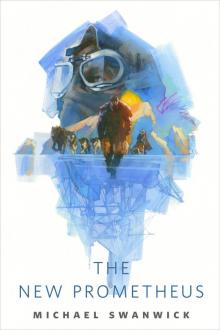 The New Prometheus
The New Prometheus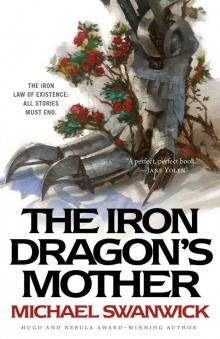 The Iron Dragon’s Mother
The Iron Dragon’s Mother The Mongolian Wizard Stories
The Mongolian Wizard Stories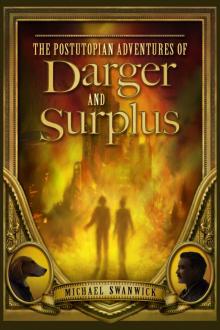 The Postutopian Adventures of Darger and Surplus
The Postutopian Adventures of Darger and Surplus Day of the Kraken
Day of the Kraken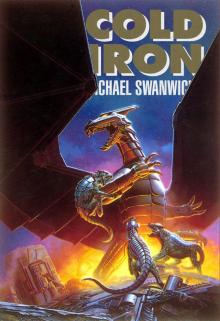 Cold Iron
Cold Iron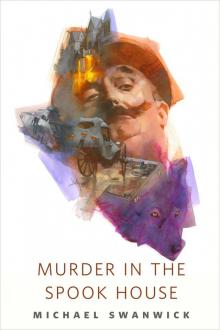 Murder in the Spook House: A Tor.com Original
Murder in the Spook House: A Tor.com Original Radio Waves
Radio Waves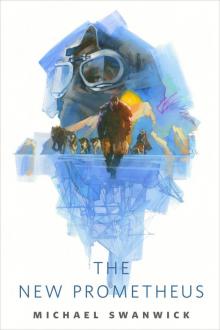 The New Prometheus: A Tor.com Original
The New Prometheus: A Tor.com Original Stations of the Tide
Stations of the Tide Vacuum Flowers
Vacuum Flowers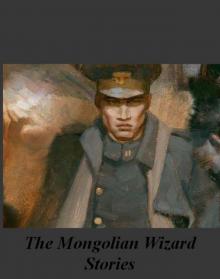 The Mongolian Wizard Stories (online stories 1-7)
The Mongolian Wizard Stories (online stories 1-7)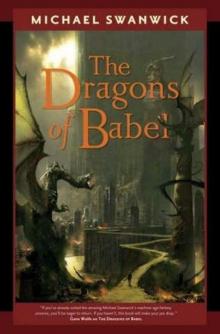 The Dragons of Babel
The Dragons of Babel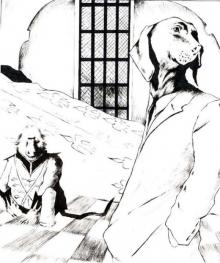 The Dog Said Bow-Wow
The Dog Said Bow-Wow Griffin's Egg
Griffin's Egg The Best of Michael Swanwick
The Best of Michael Swanwick Not So Much, Said the Cat
Not So Much, Said the Cat In the Drift
In the Drift Vacumn Flowers
Vacumn Flowers Slow Life
Slow Life The Wisdom Of Old Earth
The Wisdom Of Old Earth Legions In Time
Legions In Time Scherzo with Tyrannosaur
Scherzo with Tyrannosaur The Year's Best Science Fiction (2008 Edition)
The Year's Best Science Fiction (2008 Edition)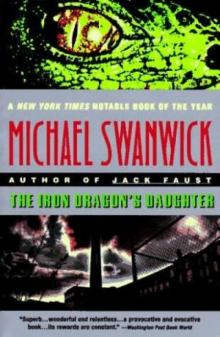 The Iron Dragon's Daughter
The Iron Dragon's Daughter The Very Pulse of the Machine
The Very Pulse of the Machine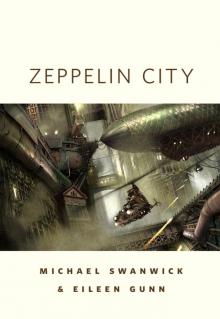 Zeppelin City
Zeppelin City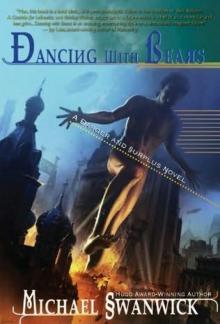 Dancing with Bears
Dancing with Bears Bones of the Earth
Bones of the Earth Tales of Old Earth
Tales of Old Earth Trojan Horse
Trojan Horse Radiant Doors
Radiant Doors